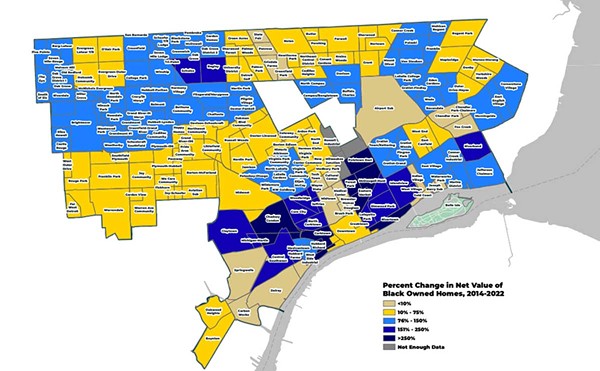"Let me make one thing perfectly clear: I don't want an emergency manager making decisions for my city."
—Detroit Mayor Dave Bing
"The city of Detroit DOES NOT need an Emergency Manager!!! BING JUST NEEDS TO SHOW SOME DAMN LEADERSHIP..." —City Council President Charles Pugh, via Facebook.
What I am about to say may get me a lot of hate mail but, sorry, I disagree. I think having the right emergency manager for a time might turn out to be a good thing for Detroit.
That's not a popular opinion among the people I naturally respect, hang with and gravitate toward. Ron Williams, the founder of this newspaper, and a man for whom I have infinite respect, sent me a plea recently to help fight this law.
He — like lots of other people — are outraged about the beefed-up emergency manager law passed this year, which, in his words, "allows the governor to appoint an 'emergency manager' to take over any city, town or school district."
Williams, who these days is fighting to create sustainable communities (happyfrogdetroit.com), correctly points out that such a manager now has the "power to dismiss elected officials, shred union contracts, sell public property, and even dissolve local government entities."
That's all true. The proposition that appointing an emergency manager to run Detroit would be awful is pretty much an article of faith among those who call themselves progressives, liberals or identify with those communities dedicated to civil rights and civil liberties.
So why do I think this might be a good thing? For the following reasons:
Detroit government is terribly broken and dysfunctional in a way it has so far proven impossible for elected leaders to repair. The basic problem is this: What was once a prosperous city of nearly 2 million people is now a largely dilapidated and shrunken one of barely 700,000 mostly very poor people.
In addition to vast debts and a current budget deficit, the city has a social services and public employee sector built for a larger, richer city, and can no longer sustain it. Especially not in the face of massive revenue cuts from the state.
There have been layoffs and more salary cuts and layoffs and salary cuts, and as I write this, the mayor and the council are squabbling further about how many more workers to dump.
Alas, none of this will work, except to slightly postpone the inevitable. The city is trying to deal with its problems by using "salami tactics" — cut a little and then a little more — and is instead dying a death of a thousand cuts.
Whether the city runs out of cash next April or July or limps along to September really doesn't make very much difference. What's needed is to start all over again — some equivalent of zero-based budgeting, and that can only realistically happen under an emergency manager.
Yes, they may throw out union contracts that are no longer sustainable; this will happen in some form anyway.
There are two recent, real-world examples that have helped me come to this conclusion — one from the public sector, one from the private. The first is Hamtramck, which landed under what was then called an Emergency Financial Manager back in 2000, largely because of the irresponsibility of many generations of its politicians. Lou "Bud" Schimmel was appointed EFM then, and made a lot of decisions that were wildly unpopular. But they also got the city back on its feet, and it emerged much healthier seven years later.
Everybody — all the politicians — hated Schimmel, but when he was there they would take me aside and say off the record, "Look, he's an SOB, but we know we needed him; the place was a mess."
The even bigger example was what was once the world's biggest corporation, an outfit called General Motors. Less than three years ago, it too was on the rocks, and it went to the government and begged for a bailout. Essentially, President Obama became GM's emergency manager, and soon sent in a surrogate.
What was the result? The company was reorganized; dead wood was pruned; it became leaner and meaner and today has returned to health and is making billions of dollars.
Ideally, that's what will happen with Detroit too. Not without pain, lots of pain. But that may be a good thing too. The needs and suffering of the Motor City may be laid bare for all to see.
Now, there are, of course, risks. Williams believes the emergency manager law is really all about protecting and advancing corporate interests. There is certainly some truth in that.
But while Gov. Rick Snyder does seem to have an almost childlike faith in the private sector's ability and eagerness to create jobs — a faith not justified, in my opinion — he is not a union-hating ideologue, like his counterparts in Ohio and Wisconsin.
He also knows that, in the case of Detroit, a rational plan for "protecting and advancing corporate interests" means restoring the city to the point where it can provide services and educate and provide jobs for its people. A public version of the "cushioned bankruptcy" that GM went through might help get us there.
There are risks, of course. Nobody will say this on the record, but some are worried about the possibility of civil unrest.
Sadly, that probably means that it would be a bad idea to name an emergency manager who was not African-American. Naming Lou Schimmel, a white accountant from Waterford, wouldn't work here.
Schimmel is now the EM in Pontiac, anyway. Nor would it be a good idea to name Dave Bing to the job. That would set a terrible precedent. He has already announced he intends to run for re-election in two years. Every mayor in the country probably has had a fantasy of not having to worry about the council or the unions and having absolute power; helping them fulfill it would in no way be healthy.
The best person I can think of as an emergency manager for Detroit is Joe Harris, now the EM in Benton Harbor. He was Detroit's auditor for a decade, and knows how the city's finances work.
There may, however, be better people. It needs to be said that it is possible, even likely, that the whole process will get put on hold. A group called Stand Up for Democracy is now collecting signatures to put a measure on the November 2012 ballot asking voters if they want to repeal Snyder's Emergency Manager law.
They only need 161,308 valid signatures to do that, and the odds are good that they'll collect enough, perhaps by the end of the year. If so, the law will be put on hold once the signatures are certified, a process that can take up to two months.
What would happen to emergency managers named before that? A spokesman for the Michigan Secretary of State's office says nobody knows, but I think it is likely they'd stay in place till the election. It also could be that the earlier, somewhat weaker emergency financial manager law would remain in force.
Nobody knows how this will play out, but it would be hard to exaggerate the size of the crisis Detroit faces. A few layoffs and begging the state to give revenue sharing money back aren't going to fix it. You can expect this story to be with us for many years to come.





